|
days of school left = 36 hours left = 270
kids of my own leaving middle school = 1 kids of my own coming to middle school = 1 tears I will shed at each of their graduation ceremonies = gajillions
5 Comments
Since we are on school vacation this week, this is not really school-related, but parents, you may relate to me. Or not.
If you know me, you know that I adore my children and husband. However, having 3 kids is never easy - I knew it wouldn't be and I never, ever regret having 3. But sometimes, like yesterday, the first day of a 3 day trip to Boston, my nerves are tested to a point where I actually look into booking a separate hotel room for myself. I may have done this last night at a point of desperation. My kids are privileged to be able to stay in hotel rooms sometimes. They are lucky to have been traveling to Europe since they were infants, and Puerto Rico, and a lovely Disney cruise for my parents' 40th anniversary. We don't travel in luxury, but they GET to travel. One day, they will have enough perspective to appreciate this (that is the hope, anyway). We came to Boston for a special event: my mother is being recognized as a Distinguished Alumni at the Boston State House. We are going to a nice luncheon. Everyone will be dressed up. Everyone better behave or I might actually lose it. So as my eyes opened this morning after a very restless night, I thought of some advice for parents who are thinking of traveling with their children soon. I think when you have 3, it makes for a special explosive dynamic, and when the oldest is the know-it-all 14 year old, and the oldest AND youngest AND the dad have ADD and the middle child gets frustrated by all of it and feels lost in the shuffle, it's especially fun. Maybe this only happens in my family and you have excellent traveling stories with your children. But if not, here are some tips for the future. 1. Stay at home. Seriously. This might be the best option. 2.Travel separately. If you are flying, book yourself a first class seat and let the kids fly coach. If you can afford it, buy a ticket for a nanny to travel with you and sit with them (I honestly know someone who did this). If you're driving, take 2 cars. Let your husband drive with the kids. Drive in your own car, blasting the Go-Gos or salsa or rap or AC/DC, or whatever music makes you happy, and sing as loud as you want to. Prepare your nerves for what is to come. 3. Get yourself a separate hotel room. Set everyone up in their room, and then say good night. Retire to your room, and if you thought ahead, you will have a bottle of wine ready in your room - my friend Heather never travels to hotels without one. In the morning, when you go see the kids, hope that they have made it through the night in one piece. Open the door to their room and announce in your cheeriest voice, "Breakfast!!" and begin to sing "Oh, what a beautiful morning!" as you whip open the curtains. Then say you will meet them at breakfast, and leave. By the time they get down there, you will have finished a peaceful breakfast and can head back upstairs, leaving them to figure out the waffle iron, and letting someone else deal with the spills. 4.Leave the kids in the hotel room. Go visit the city, walk as much as you want without hearing whining, and visit every museum you would like to, stopping for coffee and pastries or cocktails in between. 5.If you take them with you walking through the city, walk 20 paces ahead of them, with earplugs. Or just completely ignore all complaints about tired feet and hunger. Answer everything in your cheery voice. This will most certainly piss them off. 6. If they make you crazy, give them all the silent treatment. For the whole trip. I tried this for 2 hours last night and it scared them, at least. 7. If you are out with your kids and they act out, pretend they are not yours. Watch them from a distance, shaking your head and frowning. In all seriousness, though, I hope that with each trip, my kids appreciate traveling more. As they get older, it does not get easier, I have to say - it just changes. When they were little, it was all about changing diapers in the tiny airplane bathroom, or worrying about their feeding and sleeping schedules. Now it's a whole other animal. Even with their own electronic devices and a baggie of snacks, there are things to fight about. My favorite latest thing is the hotel safe: they have a competition as to who can take the most washcloths and put them in there, and figure out the new combination. I'm hoping today will be a better day. Maybe our special event will be more conducive to good behavior. Maybe the wonderful, nice, caring, beautiful qualities my kids have will shine through. Or, maybe we will get kicked out of the State House. I'll let you know. It's 2 days away from our spring vacation, and now that it is finally looking and feeling like spring in New England, students and teachers alike are getting antsy. It become harder to keep our students' attention, and frankly, we often have less energy to try to do so! So far I have managed to hold the attention of my oral communication students by reading stories and doing activities from this book: The book comes at a perfect time in my class. If you have been reading this blog, you know about some of the drama (boy-girl) that has been going on. This week it's girl-girl friendship drama. Never a dull moment! Because the book gives many prompts for writing and activities, I decided to have the students make homemade journals with construction paper and lined paper inside. The first activity was to decorate the cover, showing their own culture vs. their American culture. This came out of a reading about identity, and how ELL students often live in 2 worlds: their school world and their home world. Sometimes, they begin to identify more with Americans, but still feel a part of their culture when at home. The duality of their worlds is something with which many ELL students as well as students of color are familiar. I modeled the assignment for them by making my own journal cover: I then broke it down with the students by projecting my cover and asking them what they saw, and which side they thought was my American one vs. my Puerto Rican/Spanish one. I made it sort of obvious so they would get the idea. One student did not understand why, as an American myself, I had 2 sections. Wasn't I "American"? This led to a discussion about nationality vs. ethnicity. I made a quick chart on the white board to try to illustrate the differences. We talked about how you can have passport from one country, but feel connected to another culture/country. My Syrian-Austrian student was a perfect example. Born in the U.S., raised in Austria to Syrian parents who them immigrated here, she lives in a complex world in terms of identity. Here are some of the covers they did: I then modeled the next assignment, which was to describe their journal covers. I read mine, then gave them a graphic organizer and checklist to start to work on theirs. Some of the results brought tears to my eyes, but reminded me why I love teaching ELL. The connections I can make with students, and the little I can try to do to help them feel more visible and comfortable here, are the things that drive me every day. After a mind-numbing and annoying start to the day - a meeting about discipline data at our school and how we are tracking discipline - the students' work helped me put it all in perspective. I am grateful every day that I get to teach these students. We will keep adding more to the journals, and, they don't know it yet, but we'll have some sort of presentation where we invite all their other teachers as well. Here are some of the journal cover explanations. I think writing to work out some of these complex issues is a great strategy to help my students better deal with the duality and the culture shock they might feel. As you can see, some of them definitely appreciate aspects of their lives in the U.S., but at the same time, they deeply miss their countries, and the families, cultural ways, and communities they have left behind.
I have updated the look of the website, and I am testing out new features. Tell me if you like how it looks! As the mother of rising 5th, 7th and 9th grade children, the end of the year brings lots of bittersweet feelings, nostalgia for the toddler years, and anxiety about next school year. Up until now, though, school has been a known quantity - I know many of the teachers and the system at the elementary school where my daughters and son all were/are students, and I work at the same middle school they will pass through. For the first time, though, with my son going into 9th grade, I don't really know what to expect.
Even as an adult, our local high school seems like a big and scary place, with many hallways, stairwells and almost a thousand students. The students are much bigger than middle school students; they seem supremely self-assured, like they own the hallways. Yesterday I had the opportunity to accompany my advisory students to the high school (which is just across the street from our middle school) as they had their first orientation, called "Step Up" day. I was probably as excited/nervous as they were as we walked in, and I realized that I could get a good idea of what my son's high school life might be like next year by being there. When I taught Spanish, I had more than 100 students every year, so I ran into many former students there. It was reassuring to see them grown and changed. We took a tour of the school and observed classes in action, all the while led by our high school student leaders. I was struck by some of the things I observed. 1. Middle school children eventually do become young adults. There is a transformation that happens that is incredible to see on the other end: - Awkward young teens become beautiful and unique young people. - Pesky kids who drove us crazy mature and become serious about academics. - Kids about whom I worried turned out awesome. - Kids I never thought would make it are going to great colleges or have other great plans, and are involved in ways I could never have imagined. 2. These high school students were much more confident and unafraid to be themselves than I remember my peers and me in my high school experience. 3. There was a level of independence and responsibility that I found refreshing. It made me wonder if we are preparing our students well enough at the middle school to handle that independence. 4. There didn't seem to be "popular" groups or lots of cliques. Of course, I didn't see the cafeteria in action, so I could be wrong. 5. The range of choices students have is really incredible. From photography, with a real darkroom, to pottery, to 2-D and 3-D art, acting, and so on - the choices were wide-ranging and exciting. 6. The advice the student panel gave the middle school kids was mature, sage advice! Like: "Get to know your teachers really well" and "Focus on your academics" and "You need to be accountable for your own work, no one will be after you for you to finish it." All things that sound very adult. As I left the high school with my advisory, I felt reassured, amazed by the quality and passion of the high school teachers, and excited for my son's upcoming high school experience, hoping he will find his niche and take full advantage of all the opportunities. Short weeks somehow always seem longer than our regular weeks at school, something I never understood. This week is only 4 days and today is technically Thursday but really like a Friday since we are off tomorrow. In any case, it has felt loooong. Thankfully we have spring vacation in 2 weeks, because I feel like I am dragging myself towards it. It also is the time of year when some students start to act out more, and the drama level gets higher (which is pretty high already in middle school).
Let me describe our school to you in the last week or so. The fact that it's been cold until now, and we still have snow on the ground, you'd think would help keep our students' hormones at bay. But, no. Spring fever is here anyway. Just in my class, I discovered yesterday that my Chinese student and my Austrian student have a crush on the Korean boy. The Korean boy is oblivious, apparently. The new Dominican boy likes the Austrian girl. The Puerto Rican and Cambodian girls have uncontrollable giggles observing this all. In the school in general, there is more giggling and girls prancing in the halls, and boys posturing and flipping their hair. The 8th graders are beginning to push back more in their subconscious attempt to break away from their middle school teachers as they get ready for high school. As the weather warms up a little, students will push boundaries of rules more, like dress code, cell phone policy, etc. The 7th graders are beginning to feel older and "wiser" as the incoming 7th graders prepare to come visit. The adults are getting worn down. However, my colleagues are so awesome that instead of getting unkind or snippy with one another, we are just getting more jokey with one another, and the snarky jokes are starting to come out more. Yesterday for April Fool's Day one teacher taped a paper to the copy machines that said "Now voice-activated!" That same teacher brought a selfie stick to his class, instantly earning some teen cred with his students. Another teacher has posted fun "Faculty activity" posters in the faculty lounge, which consist of naming all the states and their capitals, remembering lists of things like the 7 deadly sins, the 7 dwarves, the Harry Potter book titles, and so on. And there is a doodle page, and magnetic poetry on the fridge (which I brought in last year). Keeping it fun in the midst of talk about data, school cameras, and the blaming and disempowering of teachers. In my own personal case, my 14 year-old has apparently learned everything he needs to, and is now able to teach me things, because he knows it ALL. And has way more experience than me in EVERYthing. And is ALWAYS right, about everything. Aren't I lucky? For example, yesterday he declared that sexism no longer exists in this country, only in others. As a women's college graduate, you can bet we had a very "lively" conversation after that comment. MCAS and April Fool's Day added interesting dimensions to the short week. On the 2 MCAS days, I had the ELL students who do not take the ELA test because they have been here less than a year. They were completely befuddled by the strange way things happen during MCAS: monitoring kids outside of the bathroom, the atmosphere of seriousness that descends on the school. Yesterday one of my students played an April Fool's joke on me (thankfully, only one, and it didn't involve cockroaches. Phew!). She had hear head down and was crying in class - real crying, with real tears and tissues. Of course, I got worried; I went to find her guidance counselor, I called the other ELL teacher, I sat next to the student and patted her on the back, tried to coax her into talking to me. Nothing seemed to work. Later, I found out when she came back for my other class with her, as she walked in with a huge smile on her face and in a much better mood, that it was all a joke. I started the class with a lesson on the origin of April Fool's Day - which I had already planned - and took the opportunity to explain that often April Foll's jokes are short, funny, and don't make people worried or upset :-) We all laughed about it, and somehow, being the same student who asked me what the middle finger means, I wasn't all that surprised that she did this. This morning I opened my classroom door to look out in the hallway and saw not one, not two - but FOUR administrators investigating a strange smell in the hallway. They were literally sniffing lockers, one by one, and looking very worried and serious, walkie talkies clinging to their belts. I hope it's not what they thought it might be, but instead a rotten salad or funky-smelling socks or something harmless. Just another day at middle school. |
|
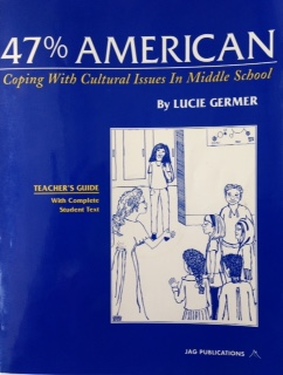
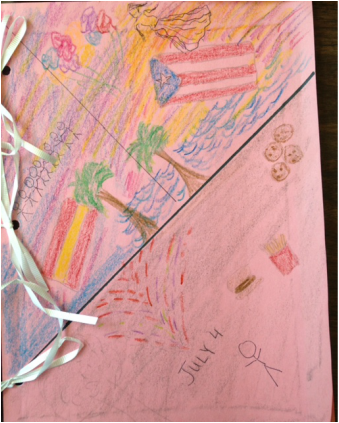

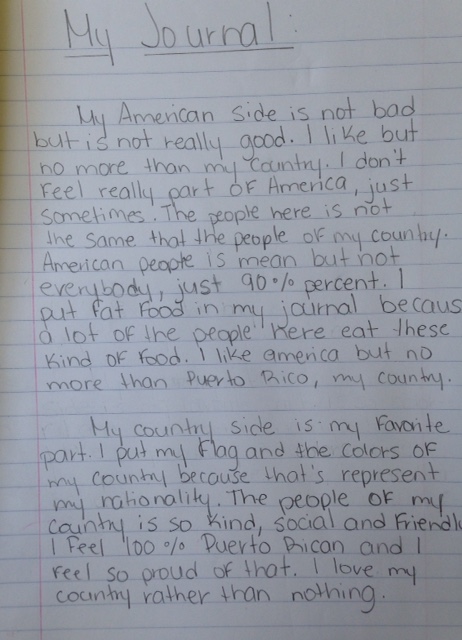
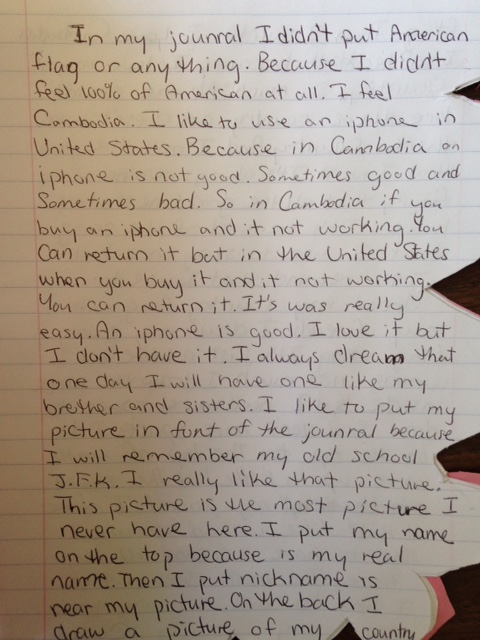
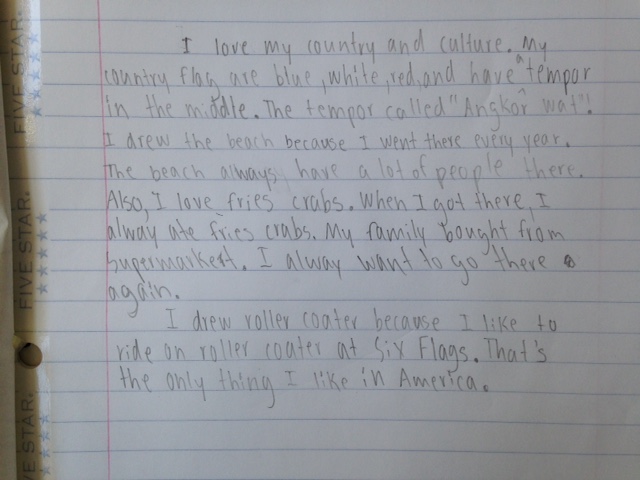
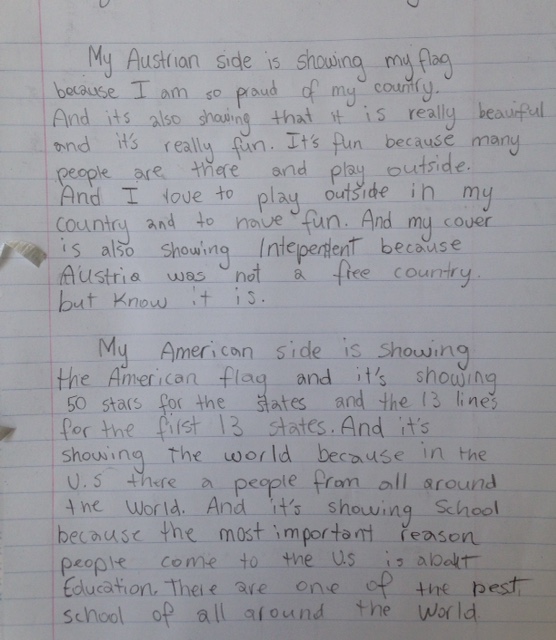
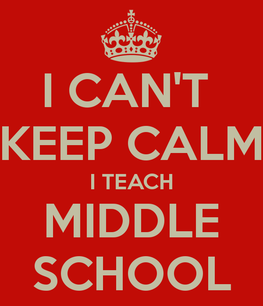

 RSS Feed
RSS Feed
